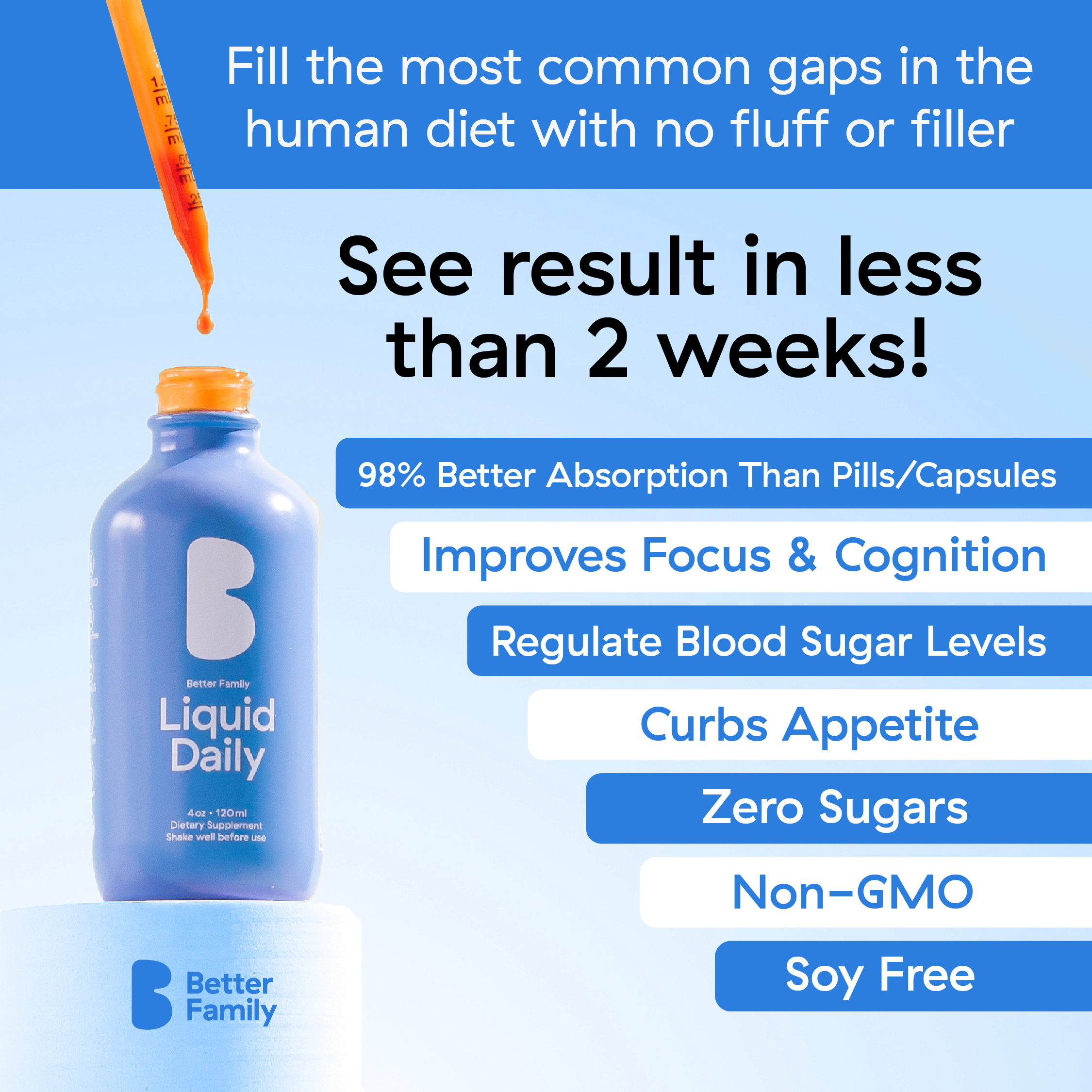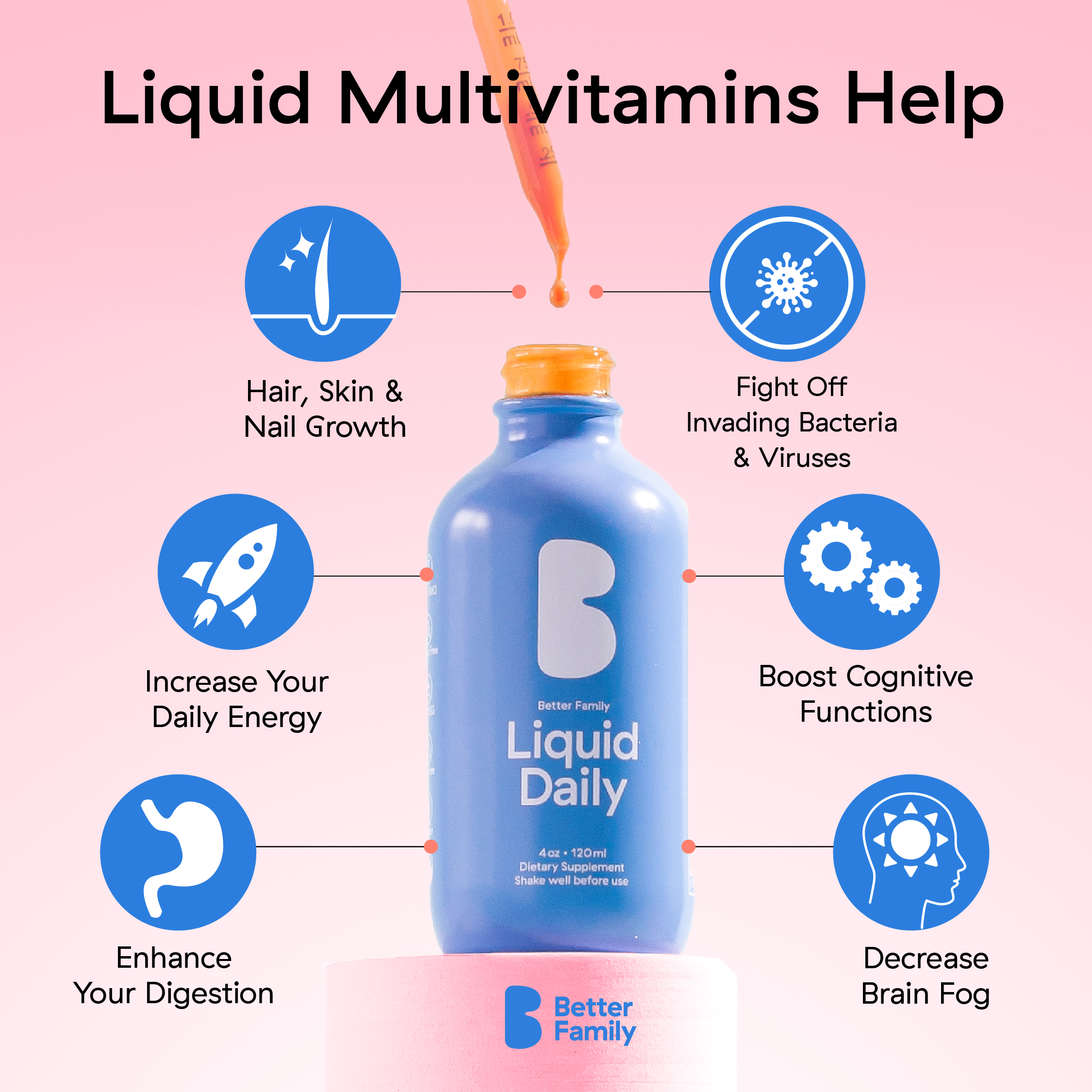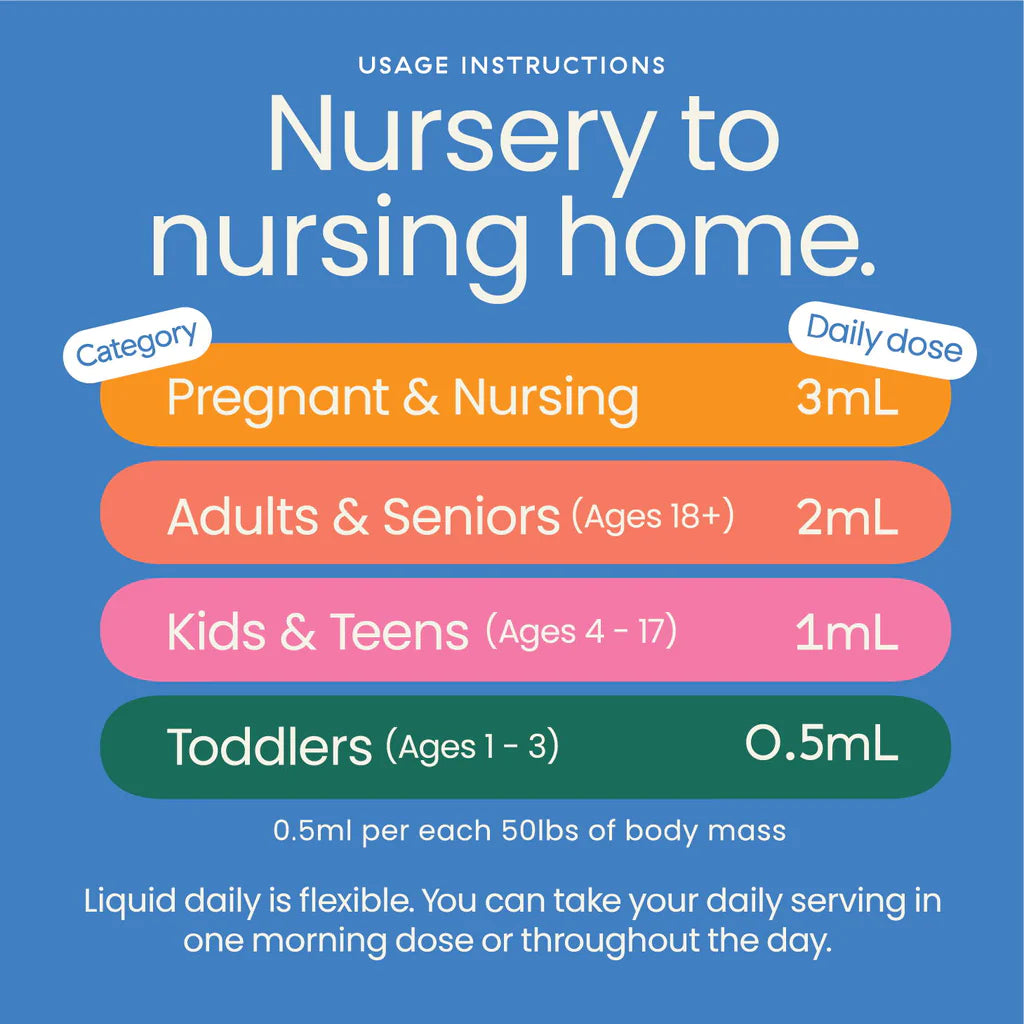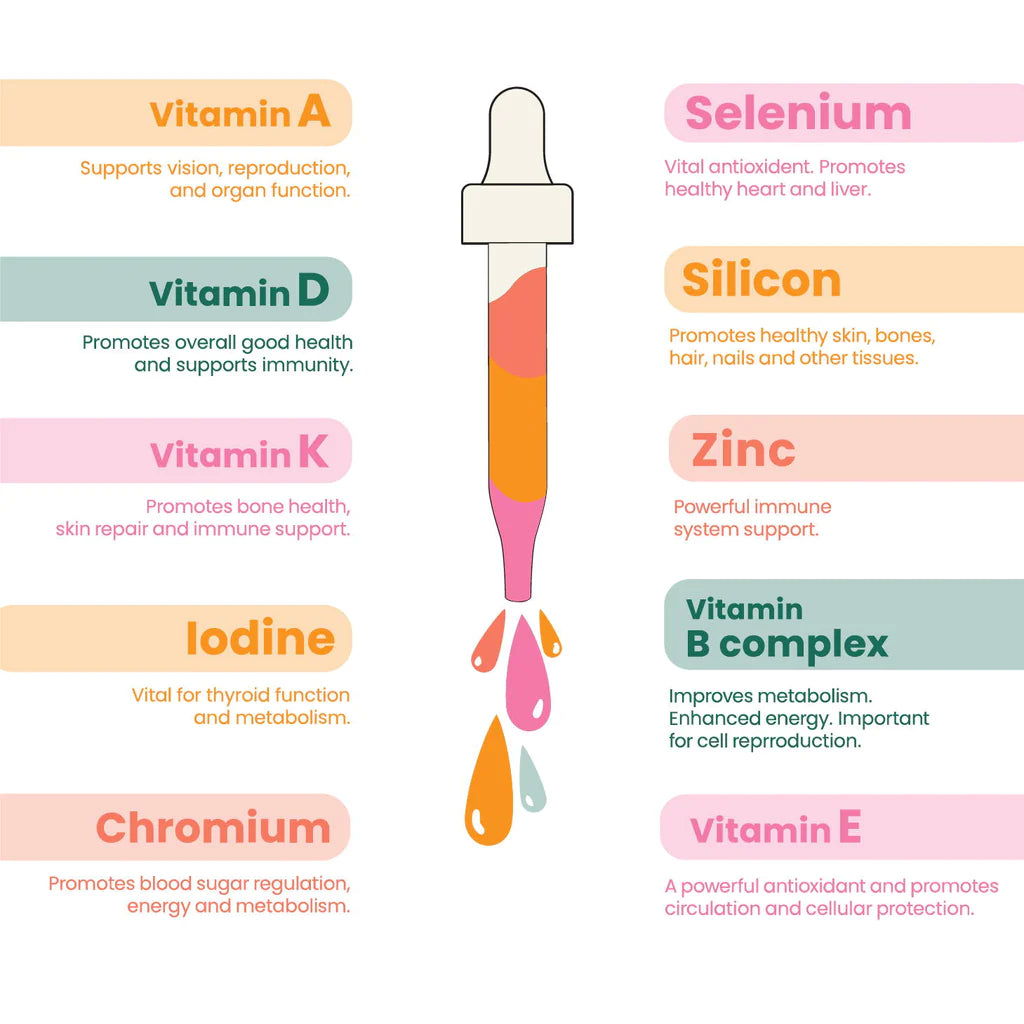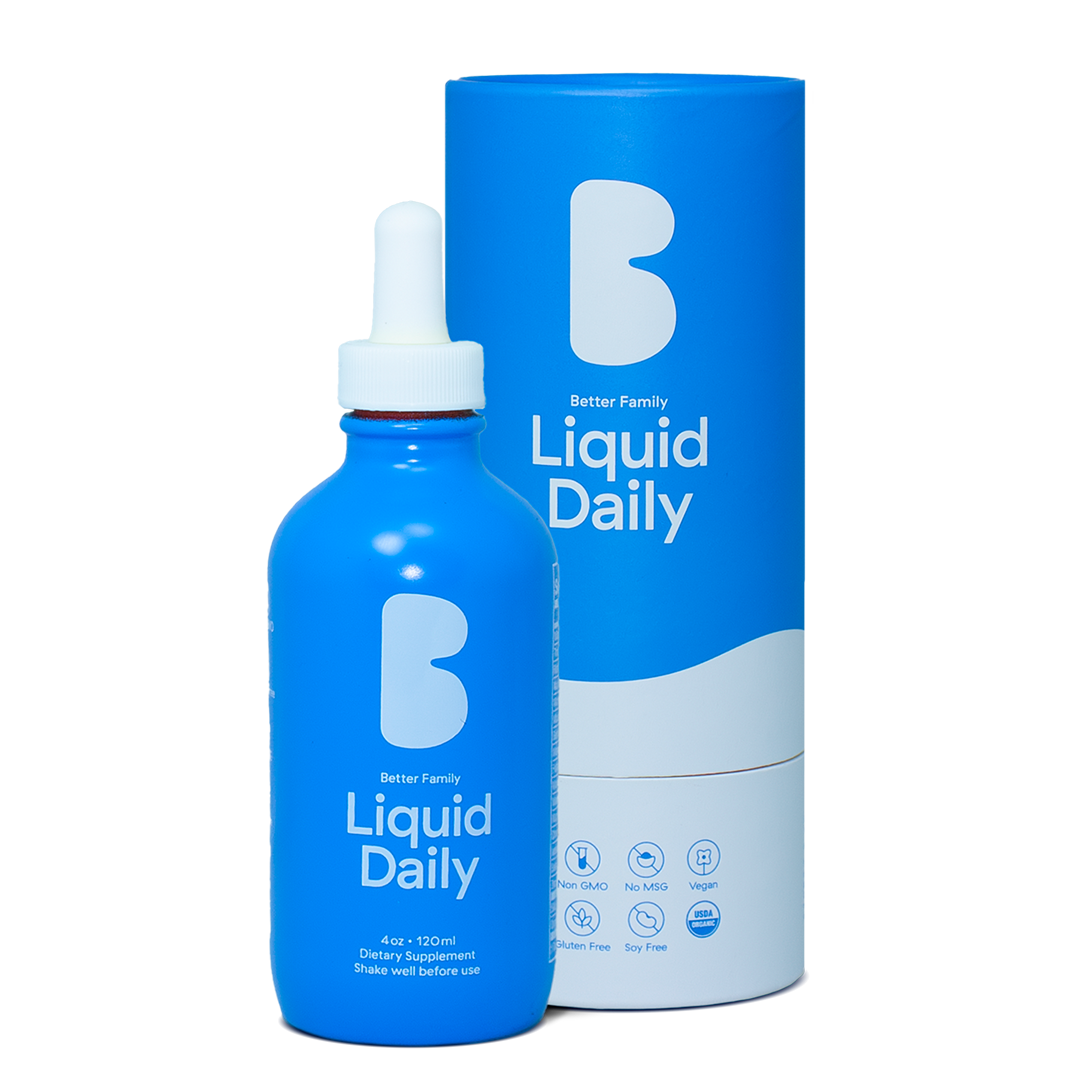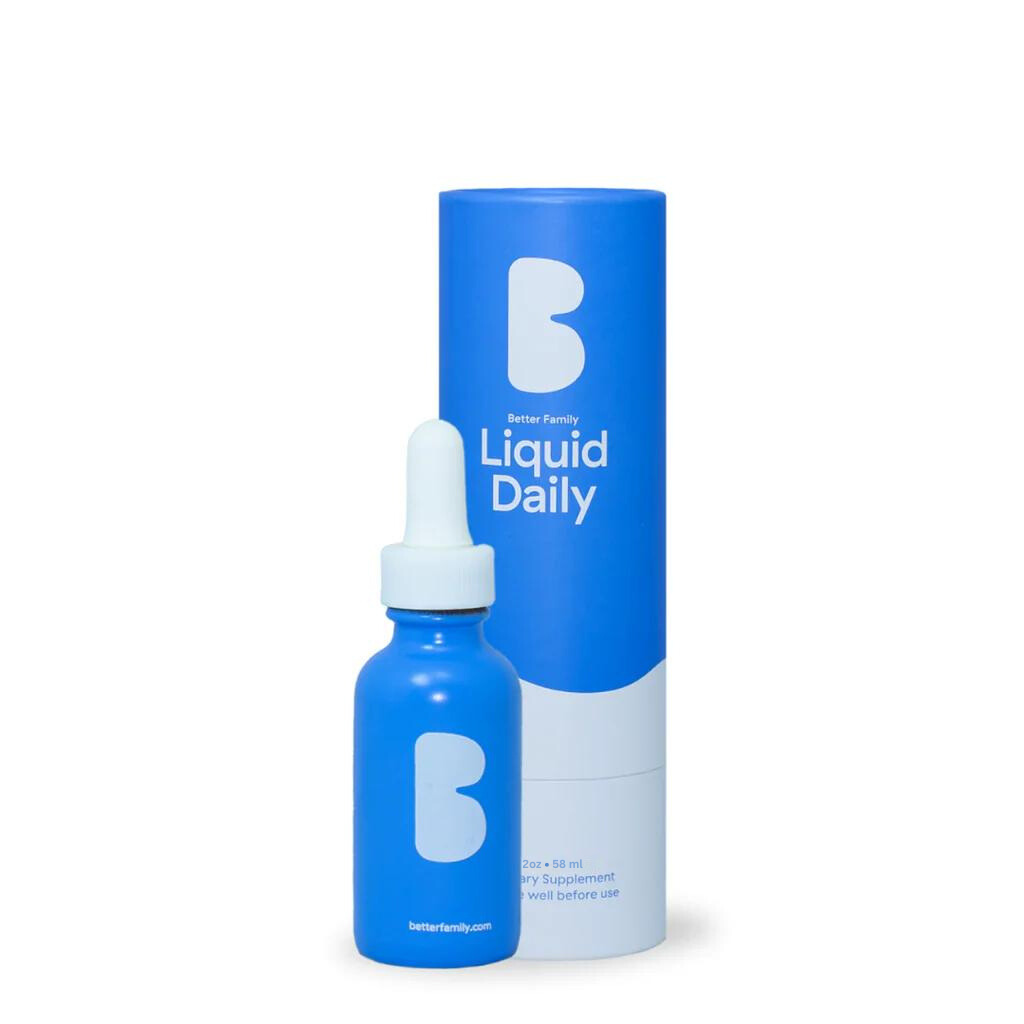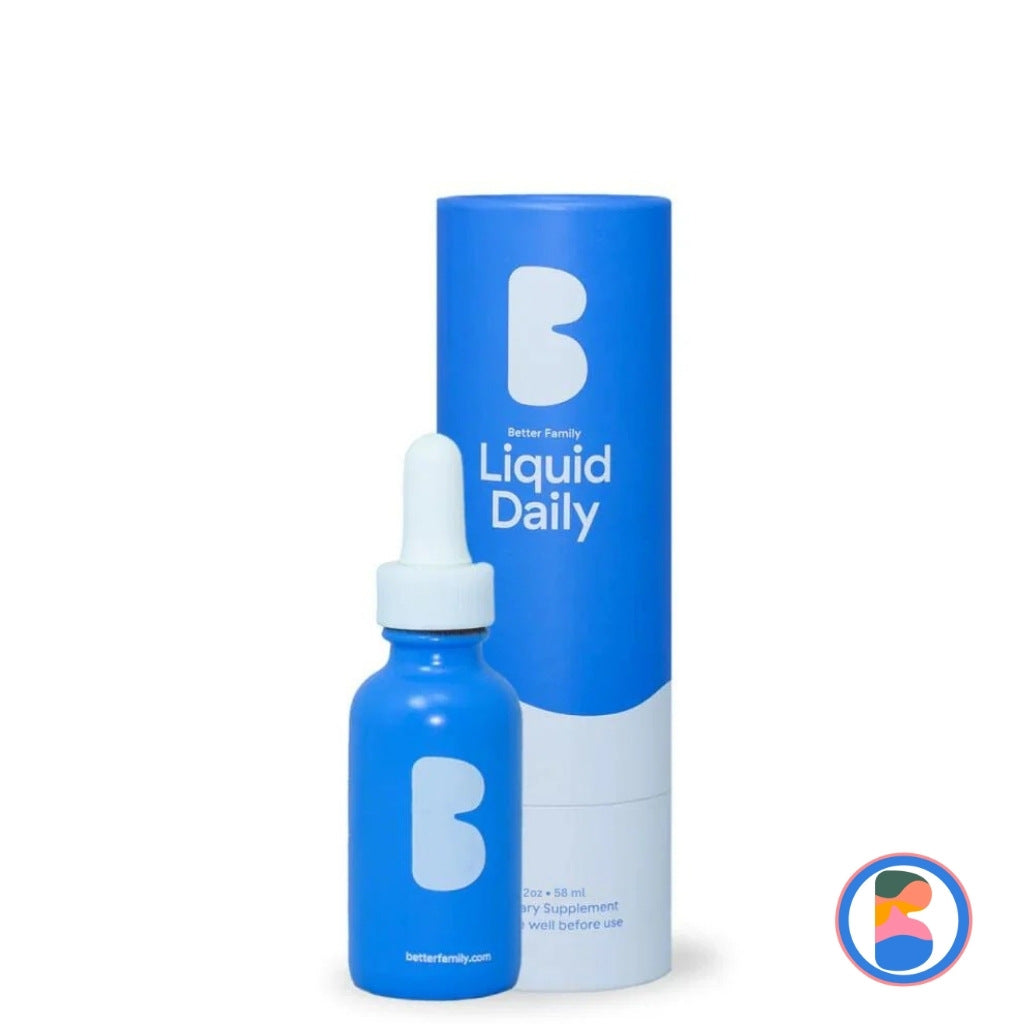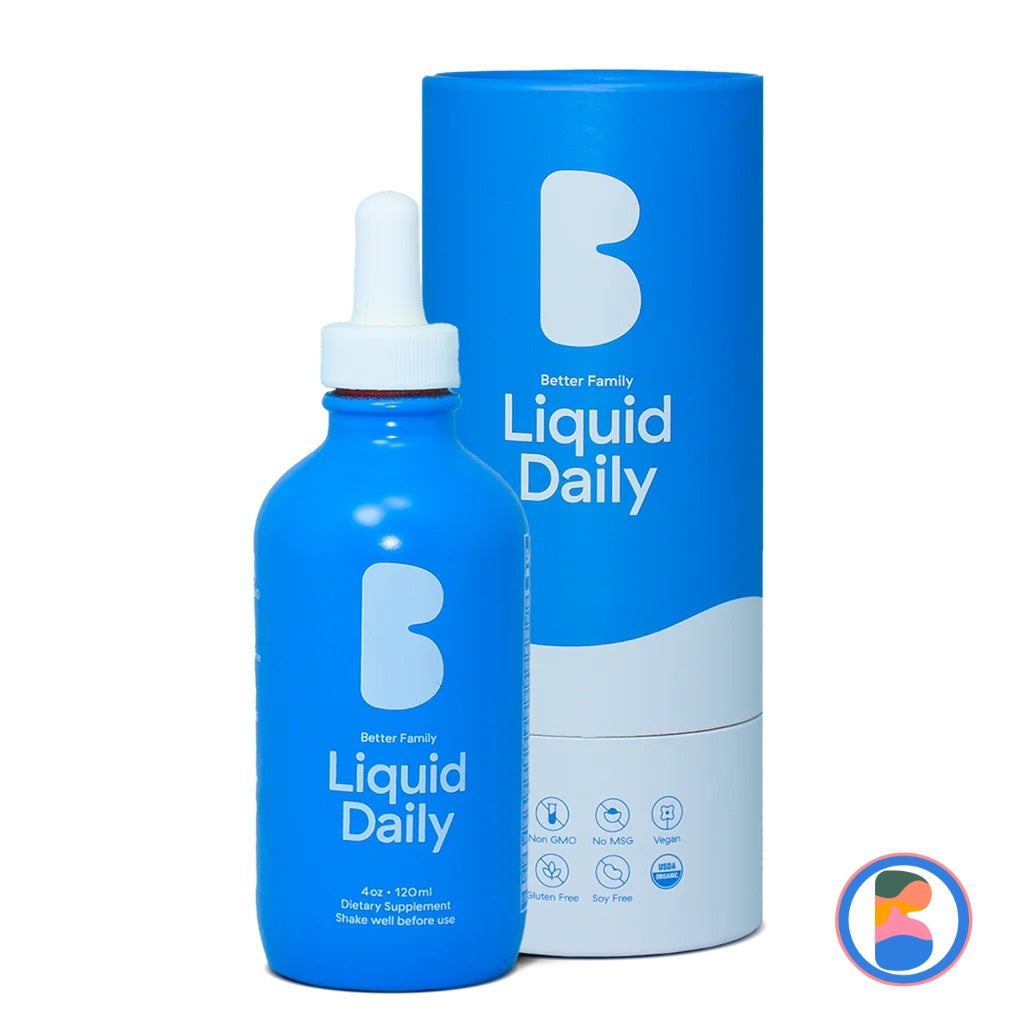Better Family Article Series
Liquid Multivitamins
The Absorption Advantage
This article series is brought to you by the team behind Liquid Daily: the better option for filling nutritional gaps in your household.
Liquid Is Better
Simplify Your Routine
You're In Control

Article Highlights
- Prenatal multivitamin benefits can be numerous, and adequate nutrition is vital for the health of both expecting mothers and their unborn children.
- The best prenatal vitamins on the market are those that strike a perfect balance between effectiveness, safety, and convenience.
- Liquid Daily, as one of the best liquid multivitamins for adults, provides a balanced combination of vital nutrients that may be lacking in a typical diet.
Prenatal Multivitamin Benefits
Prenatal multivitamin benefits can be numerous, and adequate nutrition is vital for the health of both expecting mothers and their unborn children. These essential nutrients not only support the proper growth and development of the fetus but also help maintain the mother's overall well-being during pregnancy.
Prenatal vitamins are often formulated to contain all the necessary ingredients that promote a healthy pregnancy, including folic acid, iron, calcium, and various other vitamins and minerals.
One specific area in which prenatal multivitamin benefits can be observed is in hair health. Many women have reported experiencing the benefits of prenatal vitamins for hair, as these supplements often contain optimal levels of essential nutrients that promote hair growth and strength.
Some of the common vitamins that individuals seek for hair growth include biotin (vitamin B7), niacin (vitamin B3), vitamin D, and vitamin E. Important nutrients such as these work together to improve scalp circulation, stimulate new hair follicles, and fortify existing strands against breakage and even greying.
It is worth mentioning that some individuals might seek out the benefits of prenatal vitamins while not pregnant purely for their positive effects on hair health. However, it is crucial to consult with a healthcare professional before taking any supplements, especially when not pregnant or trying to conceive. This is because certain elements found in prenatal vitamins – such as high levels of iron – may cause side effects or even be dangerous if taken unnecessarily.
Nevertheless, there are numerous potential advantages associated with incorporating a comprehensive multivitamin into one's daily routine regardless of pregnancy status. A balanced diet rich in fruits, vegetables, lean proteins, whole grains, and healthy fats should provide most individuals with all the essential nutrients they need for optimal health; however, adding a daily multivitamin can serve as an extra layer of insurance to ensure that no nutritional gaps remain unaddressed.
"The vitamins are tasty and the number of essential vitamins all in one liquid is fabulous!"
- Kevin M.
Start feeling better with Liquid Daily - the liquid multivitamin packed with 18 essential nutrients & vitamins.
TRY LIQUID DAILYWhat Prenatal Vitamins Should I Take
Embarking on the incredible journey of pregnancy comes with a multitude of considerations and preparations, one of which is prenatal vitamins. The question often arises: what prenatal vitamins should I take? This is an essential inquiry, as these supplements play a critical role in ensuring the health and well-being of both mother and baby throughout the gestation period.
One might also wonder about the use of prenatal vitamins to get pregnant. Or, what are the best vitamins for hair growth?
Folic acid is particularly important in preventing neural tube defects, which can occur within the first month of pregnancy—sometimes even before one realizes they are expecting. Hence, incorporating folic acid into your daily routine ahead of time would be highly beneficial.
Calcium supports strong bones and teeth, while iron ensures that both mother and baby receive an adequate supply of oxygen through proper red blood cell formation.
When selecting a prenatal vitamin, it's essential to choose one that contains appropriate amounts of those aforementioned nutrients as well as vitamins D and B12, among others.
Consulting with a healthcare provider will allow for personalized recommendations based on individual needs.
If you find yourself pondering, "What prenatal vitamins should I take," remember that your primary goal is unique to you and should be discussed with your doctor, but you may seek one rich in vital nutrients such as folic acid, calcium, iron, vitamin D, and B12. Always consult with your healthcare provider for tailored advice on selecting the right prenatal vitamins for you, and embark on your journey toward parenthood armed with knowledge and confidence!
When To Start Taking Prenatal Vitamins
The journey to parenthood can be an exhilarating and rewarding experience, but it is also one that requires meticulous planning and preparation. One critical aspect of this process is the adequate consumption of prenatal vitamins. These essential supplements play a crucial role in ensuring the overall health and well-being of both mother and baby, starting from even before conception.
When to start taking prenatal vitamins is a question often pondered by those planning for pregnancy. Often, it is recommended that women begin consuming these supplements at least three months prior to conception.
Ensuring optimal levels of vital nutrients such as folic acid, iron, calcium, and vitamin D beforehand may significantly reduce the risks associated with birth defects, premature birth, and other complications. As important as it is to know when to begin taking prenatal vitamins, understanding when to stop taking them is equally crucial.
Prenatal vitamins serve as important tools in safeguarding both maternal and fetal health during pregnancy. Timely usage not only prepares prospective mothers for the demands of childbearing but also offers significant protection against potential complications.
Try Liquid Daily
Liquid Daily is the all-in-one liquid multivitamin that contains the highest quality formats of the most important vitamins and minerals.
- 18 Essential Vitamins & Minerals
- Advanced Liquid Absorption
- Zero sugars, fillers, or artificial flavorings
- Safe & Effective for Kids & Adults!
Prenatal Vitamins For Pregnancy
The journey of pregnancy is a magical and transformative experience, but it also carries the responsibility of ensuring optimal health for both mother and baby. One critical aspect in achieving this goal is the role of prenatal vitamins for pregnancy. These nutrient-rich supplements are often specifically formulated to support the growth and development of the baby while simultaneously safeguarding the well-being of the expectant mother.
Prenatal vitamins for pregnancy encompass a wide range of essential nutrients that cater to the unique needs of pregnant women. They typically include higher levels of folic acid, iron, calcium, and DHA (docosahexaenoic acid), among others. Folic acid is particularly crucial during early pregnancy as it aids in preventing neural tube defects in babies. Iron, on the other hand, helps in maintaining healthy red blood cells, which facilitate oxygen transport to both mother and baby. Calcium plays a crucial role in supporting muscle function and promoting strong bones for both mother and baby, while DHA contributes significantly to fetal brain development.
Pregnant women often struggle with obtaining these vital nutrients from diet alone, making prenatal vitamins an indispensable addition to their daily regimen. Moreover, prenatal vitamins also come in various forms, such as capsules, chewable tablets or gummies, liquid preparations, or even powdered mixes that can be added to meals or beverages. This diversity caters to individual preferences and ensures that every pregnant woman can find a suitable option that aligns with her lifestyle.
Still, it is always important to consult a healthcare provider before embarking on any supplement program since every woman's nutritional needs differ based on factors such as age, weight, or pre-existing medical conditions. A healthcare professional can help identify appropriate prenatal vitamins tailored specifically to her unique requirements.
Incorporating prenatal vitamins for pregnancy into one's routine is an essential step toward ensuring optimal health outcomes for both mother and child during this momentous phase of life. Providing vital nutrients through these supplements not only fosters the growth and development of the baby but also fortifies the mother's well-being, setting a solid foundation for a healthy and successful pregnancy journey.
Pregnancy Vitamins To Avoid
Expectant mothers often turn to vitamins as a means of ensuring they are providing the best possible nourishment for their unborn child. However, it is essential for pregnant women to be aware of certain pregnancy vitamins to avoid.
Vitamins play a crucial role in maintaining optimal health during pregnancy, but not all are suitable for consumption at this stage. Some vitamins can be harmful, leading to adverse effects on both mother and baby. It is vital for expectant mothers to consult with their healthcare providers before adding any new supplements or medications to their prenatal care regimen.
Pregnant women may carefully monitor their intake of foods rich in Vitamin A, such as liver and fish oil supplements. Another supplement that might be avoided during pregnancy is high doses of Vitamin E. This vitamin has antioxidant properties and plays a role in immune function; however, consuming large quantities can increase the risk of premature rupture of membranes (PROM) and other complications during delivery.
Many OTC products contain additional ingredients that could prove harmful during pregnancy or interact negatively with prescribed prenatal care medications. While vitamins play an integral role in maintaining healthy pregnancies, some should be avoided due to the potential risks they pose to both mother and baby. Pregnant women must consult with medical professionals before starting any new supplement regimen and carefully monitor their intake of vitamins to ensure they are receiving the necessary nutrients without putting their pregnancy at risk.
"I absolutely love this stuff!! It’s amazing and works great!!"
- Teresa H.
Try the lightly and naturally flavored liquid multivitamin - the perfect blend of essential nutrients, including methylfolate.
TRY LIQUID DAILYPregnancy Supplements First Trimester
To support both the mother's health and the baby's development, many healthcare professionals recommend pregnancy supplements in the first trimester. The first trimester of pregnancy is a critical time as it encompasses the initial stages of embryonic and fetal development. During this period, vital organs such as the brain, heart, and spinal cord begin to take shape. Consequently, providing adequate nutrients through pregnancy supplements can contribute significantly to ensuring a healthy foundation for the baby.
One crucial component in pregnancy supplements during the first trimester is folic acid. This B vitamin plays an essential role in preventing neural tube defects—severe abnormalities affecting the spine or skull—that may develop within three to four weeks after conception.
Another essential element included in pregnancy supplements during the first trimester is iron. Adequate iron intake supports proper blood production for both mother and baby while also preventing anemia during pregnancy. Calcium is also imperative in these early stages of pregnancy as it aids in building strong teeth and bones for babies while minimizing bone loss for mothers. Finally, omega-3 fatty acids such as DHA (docosahexaenoic acid) are often incorporated into pregnancy supplements in the first trimester due to their role in supporting fetal brain development. Research indicates that supplementing with omega-3s can result in improved cognitive function later in life for the child.
Taking pregnancy supplements in the first trimester can provide an essential foundation for a healthy pregnancy by ensuring proper nutrition for both mother and baby. It is vital to consult with a healthcare provider before embarking on any supplementation regimen and follow their guidance to determine the most appropriate supplements and doses based on individual needs and medical history.
Best Prenatal Vitamins
It is essential to provide both mother and baby with the necessary nutrients for optimal health and development. This is where the best prenatal vitamins come into play—an essential component of any pregnancy care plan. Prenatal vitamins are generally formulated to cater to the unique nutritional needs of pregnant women. They contain higher levels of certain nutrients that are required for healthy fetal development and ensuring the well-being of the mother throughout pregnancy.
The best prenatal vitamins on the market are those that strike a perfect balance between effectiveness, safety, and convenience. When considering which prenatal vitamin to choose, there are several factors to keep in mind. One vital element to look for is folic acid or folate—a crucial nutrient that can help prevent neural tube defects in babies when consumed during early pregnancy.
Another important nutrient found in these supplements is iron. Pregnant women can require twice as much iron as non-pregnant individuals due to increased blood volume and demands by the growing fetus. An ideal prenatal vitamin should contain an amount that reflects this. Calcium and Vitamin D also play significant roles during pregnancy, as they support strong bones and teeth for both mother and baby. The best prenatal vitamins will include adequate amounts of these nutrients in order to promote bone health.
Finally, consider additional ingredients such as omega-3 fatty acids like DHA (Docosahexaenoic Acid), which contribute to cognitive function and brain development in newborns. Choose a supplement that incorporates these beneficial compounds without compromising on safety or quality standards. Selecting the best prenatal vitamins involves considering the specific nutrient needs of pregnant women and their growing babies.
More articles from Better Family


